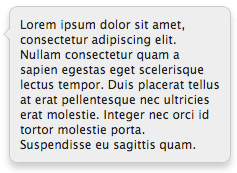PHP: Validating Numeric Values and Digits
I've inherited a lot of code where the previous developer used PHP's is_numeric() and it's gotten them into trouble. There's a big difference between validating that a value is numeric and validating that a value is all digits. Here's how to validate the two:
/* numeric, decimal passes */
function validate_numeric($variable) {
return is_numeric($variable);
}
/* digits only, no dots */
function is_digits($element) {
return !preg_match ("/[^0-9]/", $element);
}
A customer number, for example, should not have any decimal points but using is_numeric() would let a decimal value pass the test. Don't be this guy!
![Write Simple, Elegant and Maintainable Media Queries with Sass]()
I spent a few months experimenting with different approaches for writing simple, elegant and maintainable media queries with Sass. Each solution had something that I really liked, but I couldn't find one that covered everything I needed to do, so I ventured into creating my...
![Vibration API]()
Many of the new APIs provided to us by browser vendors are more targeted toward the mobile user than the desktop user. One of those simple APIs the Vibration API. The Vibration API allows developers to direct the device, using JavaScript, to vibrate in...
![CSS Counters]()
Counters. They were a staple of the Geocities / early web scene that many of us "older" developers grew up with; a feature then, the butt of web jokes now. CSS has implemented its own type of counter, one more sane and straight-forward than the ole...
![CSS Tooltips]()
We all know that you can make shapes with CSS and a single HTML element, as I've covered in my CSS Triangles and CSS Circles posts. Triangles and circles are fairly simply though, so as CSS advances, we need to stretch the boundaries...





Why don’t you use ctype_digit() instead of this preg_match()? It’s faster =)
\d is shorthand for [0-9]
@Mark: Damnit Sanborn — I’m going to make you write a regex tutorial for me! :)
why not just check if it’s an integer and if it’s a string of numbers just check if intval($num) == $num ? I tend to stray away from regex if possible.
You could also use PHP’s built-in function ctype_digit() which will return true only if all characters in the value it is passed are numeric. i.e. 1234 would return true, 1,234 returns false, 1.234 returns false.
I have definitely have seen people misuse the is_numeric function as well.
@david – a regex tutorial would be great. You can always learn something new…
Why would you create a new function that returns is_numeric, given that your new function name is longer than typing ‘is_numeric’ anyway?
You can use is_int() to find out if it’s an integer instead of a regexp or having to compare using intval() (as suggested above). The only catch with this is that is must fit within the integer type range so you may still need to use a regexp if it’s a really long number.
And I’m a little confused why you’d wrap is_numeric() inside another function call when all the wrapper function does is return the value from is_numeric()
Josh, you can use the ctype php function :)
(why my older post were deleted?)
Actually you can use is_int() if your using the is_* functions. However Alex is right and the ctype functions are better.
to check numeric variable and length of variable = 4 numbers:
preg_match("#^[0-9]{4}$#",$variable)exemple :
$year = preg_match("#^[0-9]{4}$#",$variable) ? $variable : date("Y");You can remplace {4} by {1,4} to check if variable is between 1 and 4 numbers
One important detail about ctype_digit: it accepts string as parameter.
For example:
ctype_digit(‘5’) === true, but ctype_digit(5) === false.
So it’s safer to write ctype_digit((string)$my_fancy_var) but again not enough for nulls,
booleans, objects or resources.
Doesn’t ‘/[0-9]+/’ equate to contains or or more consecutive digits. For all, I think you probably need ‘/^[0-9]+$/’ or more succinctly ‘/^\d+$/’.
Kudos to Elkalidi Abdelkader for using them but it doesn’t hurt to be explicit.
For those interested in finding a valid date, I found an issue where PHP errors would be thrown with
Checkdate(m,d,y)so I did thisif (empty($_POST['theyear'])) { //For me this was optional so for validating I allowed the field to be blank... $yearcheck = '2000'; //...but would need to still enter a year into the check (any year will work but I picked one that included leap years) }else//there is a data in the year field if (is_numeric($_POST['theyear']) //Is it a number? and strpos('.', $_POST['theyear'])==false //Is there a decimal in the number? and strlen($_POST['theyear'])==4) { //Is the number 4 digits long? $yearcheck = $_POST['theyear']; //Passed the test, checked this date }else //didn't pass the test so.... $yearcheck = '0000'; //this year will always be valid on the PHP side BUT will cause checkdate() to always return false. if (checkdate($_POST['themonth'], $_POST['thedate'], $yearcheck)==false //checks if the month date year combination is right... and !empty($_POST['grr_group_year'])) //...but only if we are entering a date to begin with $messages[] = __('Date is not valid!', 'my_page'); //My custom warning (at first I had it return the little poem for the number of dates in a month)I realize it is kind of off topic but if you combine
strposfor'.'andis_numeric()it should work the same.EDIT: grr_group_year should be theyear. I missed that when I stripped my own code out of my example.